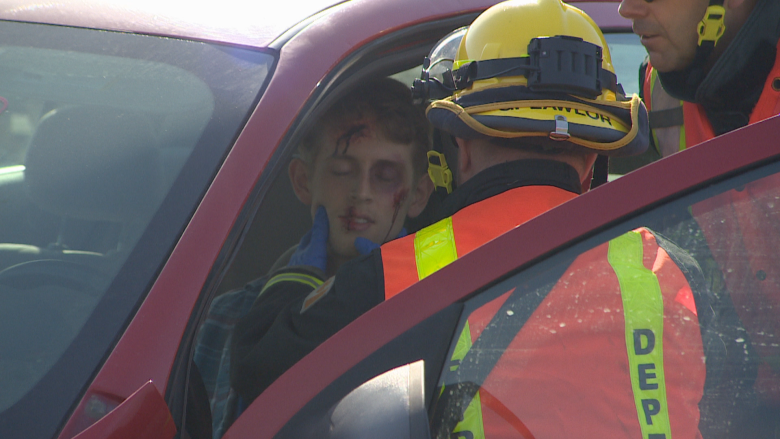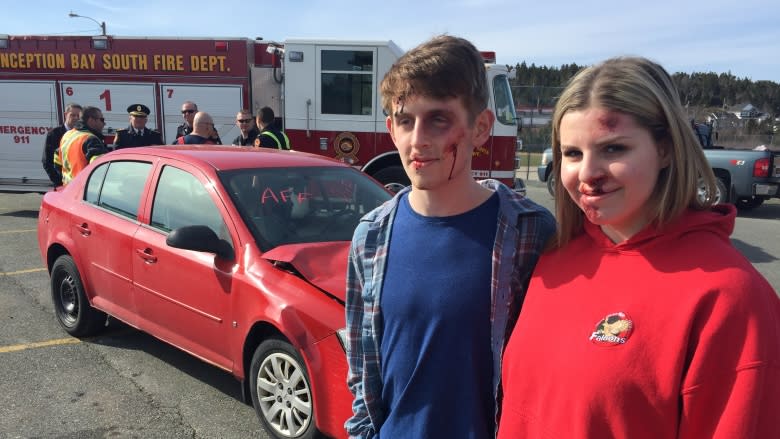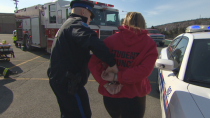High school lesson: Mock crash highlights dangers of driving stoned
"I'm a great driver, so it doesn't make a difference for me."
"Driving when I'm high means I'm less aggressive on the road."
"I actually drive better when I'm high because I'm so focused."
Those are some of the myths people hold about driving under the influence of cannabis.
On Wednesday, students at Holy Spirit High School in Conception Bay South got a first-hand look at why those beliefs are false — and dangerous — thanks to a mock car crash in the school's parking lot.
The mock crash, staged with the participation of students and first responders, was an initiative of the school's chapter of Students Against Drunk Driving.
Chapter leader Megan Coles, a Grade 12 student, said she hoped the demonstration — which included emergency vehicles, ambulances, a staged arrest, and the Jaws of Life — would bring home the reality of impaired driving to the students.
"I think that students know that it's a bad idea to drive impaired, but they don't see the actual effects that it can have," Coles said.
'It was pretty terrifying'
The accident scenario was one that could be reality for some of the Grade 12 students watching.
In the exercise, a group of students share a single vehicle with a designated driver to a party during prom week. But the designated driver has one drink and some cannabis that evening, thinking that it won't impact her driving. When she is driving home, her vision is unclear, and an accident is the result.
The staged scenario, with sirens blaring and police questioning the drivers and passengers as they would after a real accident, had an impact, the participants said.
"Everybody knows that it's a bad idea to drink and drive, but actually seeing this and the consequences — watching us get pulled out of the car and being put on the stretcher — I think it just made it that much more realistic," said Levi Moulton, student council president, who played the role of an accident victim.
During the exercise, Moulton was removed from the vehicle with the Jaws of Life before being put on a stretcher and loaded into an ambulance.
"I could literally feel the car shaking," he said. "It was pretty terrifying."
Brooklyn Roberts, the school's student council vice president, played the role of the driver in the accident. She was arrested as part of the demonstration.
She said seeing the consequences of impaired driving play out with someone they know from school had a big impact.
"It was actually really scary. I didn't think it was going to be as realistic as it was," she said.
Avoid driving stoned too
Students said some people don't realize that driving under the influence of drugs is as serious as driving while under the influence of alcohol.
"I think people do think that weed and marijuana and stuff like that won't actually impair you as much as drinking," said Nicholas Hanlon Wadman, a Grade 12 student. "But it's still intoxicated, you're still impaired, and it still has a very great effect on your reaction time and your ability."
The federal government is trying to get that message out ahead of its planned cannabis legalization, expected to come into place across the country July 1.
Last year the government announced a public-safety campaign, aimed at young Canadians, to dispel myths about driving while impaired by cannabis.
High rates of impaired driving in N.L.
Though rates are dropping across the country, impaired driving continues to be a problem in Newfoundland and Labrador.
The Atlantic provinces, along with the three territories, have the highest impaired driving rates in Canada, according to Statistics Canada.
And out of the country's metropolitan areas, St. John's recorded both the highest alcohol-impaired driving rate and the highest drug-impaired driving rate.
The accidents that result from impaired driving have an impact on the first responders as well, said RNC Chief Joe Boland. He was previously in charge of the force's traffic services division, where his job meant getting notifications that an officer was on the way to a fatality.
"To be honest with you, it'd almost make you sick," Boland said. "You almost get stomach sick thinking what a family has to go through, what our officers have to go through, what the victims have to go through."
The students also heard from people who have experienced the real-life impacts of impaired driving.
Patricia Hynes-Coates's stepson Nicholas Coates was killed by a drunk driver in 2013. She now works with Mothers Against Drunk Driving, and asked the students to practice zero tolerance for alcohol or drug use before driving.
"It doesn't matter whether it's one day, or it's 30 days, or it's 30 years," Hynes-Coates said of the impact of a fatal accident, "you still feel the loss of losing a loved one to impaired driving."












